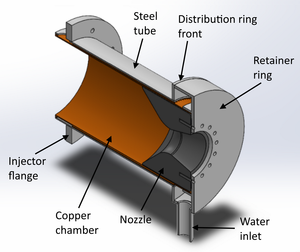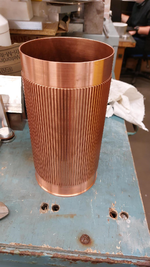Difference between revisions of "White Dwarf Combustion Chamber"
(Added more stuff) |
|||
| Line 2: | Line 2: | ||
The White Dwarf combustion chamber uses a water-cooled jacket, with a graphite nozzle. The cooling channels are cut into an off-the-shelf copper tube using a CNC machine. The outer walls of the cooling jacket are made of stainless steel and are welded together. | The White Dwarf combustion chamber uses a water-cooled jacket, with a graphite nozzle. The cooling channels are cut into an off-the-shelf copper tube using a CNC machine. The outer walls of the cooling jacket are made of stainless steel and are welded together. | ||
[[File:White | [[File:White dwarf chamber labelled.png|thumb|Cutaway of the White Dwarf combustion chamber CAD (without the injector).]] | ||
*[https://drive.google.com/drive/u/1/folders/1XDyie3lZHQ0NuAUXxY0mlWdoXsYa2d6G CAD] | *[https://drive.google.com/drive/u/1/folders/1XDyie3lZHQ0NuAUXxY0mlWdoXsYa2d6G CAD] | ||
*[https://github.com/cuspaceflight/White-Dwarf-Cooling Simulations] | *[https://github.com/cuspaceflight/White-Dwarf-Cooling Simulations] | ||
*[[:File:White Dwarf Chamber Manufacturing.pdf|Manufacturing process]] | *[[:File:White Dwarf Chamber Manufacturing.pdf|Manufacturing process]] | ||
== Copper Chamber== | ==Copper Chamber== | ||
===Useful Files=== | ===Useful Files=== | ||
| Line 19: | Line 19: | ||
[[File:White Dwarf Copper Final.png|thumb|The final copper combustion chamber, after having the cooling channels machined into it by a CNC machine in the Whittle Laboratory.|267x267px]] | [[File:White Dwarf Copper Final.png|thumb|The final copper combustion chamber, after having the cooling channels machined into it by a CNC machine in the Whittle Laboratory.|267x267px]] | ||
== Nozzle == | == Nozzle== | ||
=== Useful Files === | ===Useful Files=== | ||
*[[:File:WHITE DWARF NOZZLE.pdf|Engineering drawing]] | *[[:File:WHITE DWARF NOZZLE.pdf|Engineering drawing]] | ||
| Line 27: | Line 27: | ||
The nozzle is made of graphite, and is intended to be manufactured by [http://en.tokaicarbon.eu/ Tokai Carbon Europe]. It contains 16 holes that will contain M5 x '3D' [https://www.stanleyengineeredfastening.com/brands/optia/heli-coil helicoil] inserts, allowing the nozzle to be pulled into the retaining ring, whilst simultaneously compressing the graphite gasket in between the nozzle and retainer ring. Graphite thread failure calculations are available on the [https://github.com/cuspaceflight/White-Dwarf-Cooling simulations GitHub page]. | The nozzle is made of graphite, and is intended to be manufactured by [http://en.tokaicarbon.eu/ Tokai Carbon Europe]. It contains 16 holes that will contain M5 x '3D' [https://www.stanleyengineeredfastening.com/brands/optia/heli-coil helicoil] inserts, allowing the nozzle to be pulled into the retaining ring, whilst simultaneously compressing the graphite gasket in between the nozzle and retainer ring. Graphite thread failure calculations are available on the [https://github.com/cuspaceflight/White-Dwarf-Cooling simulations GitHub page]. | ||
== Retainer Ring == | ==Retainer Ring== | ||
=== Useful Files | ===Useful Files=== | ||
* [[:File:WHITE DWARF RET RING.pdf|Engineering drawing]] | *[[:File:WHITE DWARF RET RING.pdf|Engineering drawing]] | ||
The retainer ring is manufactured from a single large piece of stainless steel billet. It has an inlet for the water coolant, and is intended to be brazed to the copper jacket, and welded to the rest of the steel components. | The retainer ring is manufactured from a single large piece of stainless steel billet. It has an inlet for the water coolant, and is intended to be brazed to the copper jacket, and welded to the rest of the steel components. | ||
=== Notes | ===Notes=== | ||
* The design needs to be updated to include some radial leeway in the bolt holes, so that the bolts can move outwards/inwards if the graphite and steel expand at different rates. | *The design needs to be updated to include some radial leeway in the bolt holes, so that the bolts can move outwards/inwards if the graphite and steel expand at different rates. | ||
* Increased back wall thickness from 5 mm to 6 mm, so the Dyson can make the nozzle-side wall flat with a lathe if it warps after brazing. | *Increased back wall thickness from 5 mm to 6 mm, so the Dyson can make the nozzle-side wall flat with a lathe if it warps after brazing. | ||
== Distribution Ring Front == | ==Distribution Ring Front== | ||
The flat ring that encloses the inlet distribution ring is intended to be a water-jet cut piece of stainless steel. It will be welded to the steel tube and the retainer ring. | The flat ring that encloses the inlet distribution ring is intended to be a water-jet cut piece of stainless steel. It will be welded to the steel tube and the retainer ring. | ||
== Steel Tube == | ==Steel Tube== | ||
The steel tube that encloses the copper fins will slide over the copper, and is not connected to the copper directly. It is intended to be a custom-made welded stainless steel tube, manufactured in the Dyson centre. | The steel tube that encloses the copper fins will slide over the copper, and is not connected to the copper directly. It is intended to be a custom-made welded stainless steel tube, manufactured in the Dyson centre. | ||
== Injector Connection == | ==Injector Connection== | ||
Not yet designed. The injector-end flange is designed to connect to both the injector and the test stand. | Not yet designed. The injector-end flange is designed to connect to both the injector and the test stand. | ||
=== Notes | ===Notes === | ||
* The outlet distribution ring needs to have a larger flow cross section, as right now it is very narrow, which causes very large pressure drops as the coolant tries to leave it. This would also cause uneven velocity distributions in the coolant channel, as the pressure would vary significantly around the outlet distribution ring. | *The outlet distribution ring needs to have a larger flow cross section, as right now it is very narrow, which causes very large pressure drops as the coolant tries to leave it. This would also cause uneven velocity distributions in the coolant channel, as the pressure would vary significantly around the outlet distribution ring. | ||
Revision as of 15:01, 8 February 2022
Overview
The White Dwarf combustion chamber uses a water-cooled jacket, with a graphite nozzle. The cooling channels are cut into an off-the-shelf copper tube using a CNC machine. The outer walls of the cooling jacket are made of stainless steel and are welded together.
Copper Chamber
Useful Files
Made of copper due to it's high thermal conductivity, which significantly reduces the thermal stress across the walls as well as the wall temperatures. If steel was used, the thermal stresses would be much higher (and would outweigh the gain received from steel's higher yield stress).
Temperature and pressure drop predictions were generated using Bamboo, and the results are available on the simulations GitHub page.
Nozzle
Useful Files
The nozzle is made of graphite, and is intended to be manufactured by Tokai Carbon Europe. It contains 16 holes that will contain M5 x '3D' helicoil inserts, allowing the nozzle to be pulled into the retaining ring, whilst simultaneously compressing the graphite gasket in between the nozzle and retainer ring. Graphite thread failure calculations are available on the simulations GitHub page.
Retainer Ring
Useful Files
The retainer ring is manufactured from a single large piece of stainless steel billet. It has an inlet for the water coolant, and is intended to be brazed to the copper jacket, and welded to the rest of the steel components.
Notes
- The design needs to be updated to include some radial leeway in the bolt holes, so that the bolts can move outwards/inwards if the graphite and steel expand at different rates.
- Increased back wall thickness from 5 mm to 6 mm, so the Dyson can make the nozzle-side wall flat with a lathe if it warps after brazing.
Distribution Ring Front
The flat ring that encloses the inlet distribution ring is intended to be a water-jet cut piece of stainless steel. It will be welded to the steel tube and the retainer ring.
Steel Tube
The steel tube that encloses the copper fins will slide over the copper, and is not connected to the copper directly. It is intended to be a custom-made welded stainless steel tube, manufactured in the Dyson centre.
Injector Connection
Not yet designed. The injector-end flange is designed to connect to both the injector and the test stand.
Notes
- The outlet distribution ring needs to have a larger flow cross section, as right now it is very narrow, which causes very large pressure drops as the coolant tries to leave it. This would also cause uneven velocity distributions in the coolant channel, as the pressure would vary significantly around the outlet distribution ring.

